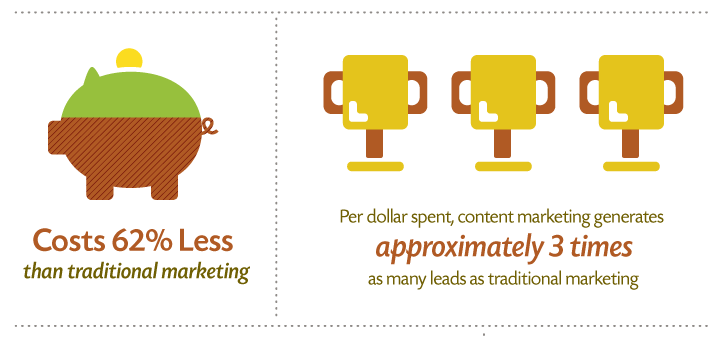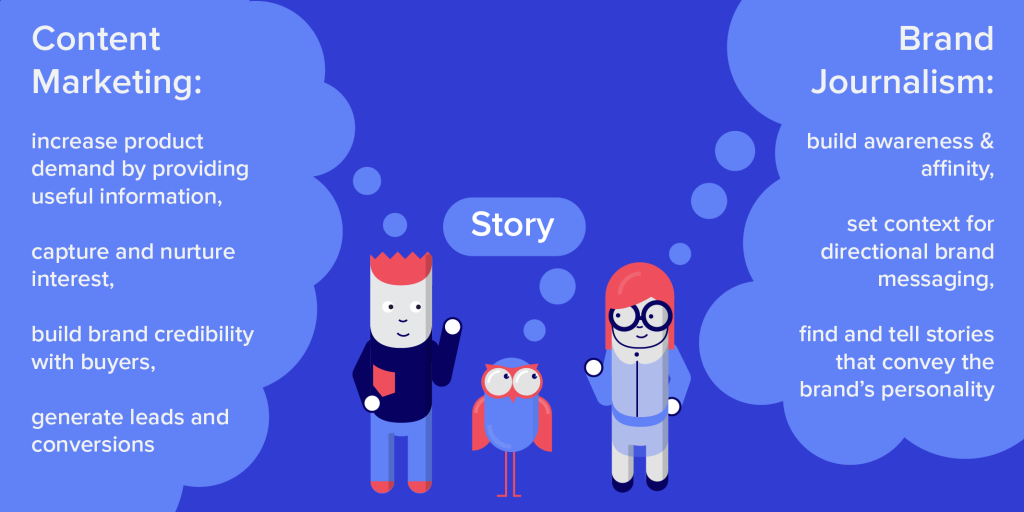
Source: Demandmetric.com
First, What is Content Marketing?
Content marketing as defined by the Content Marketing Institute is, “a strategic marketing approach focused on creating and distributing valuable, relevant, and consistent content to attract and retain a clearly defined audience – and, ultimately, to drive profitable customer action.” While it differs from traditional one-off ad-based marketing, content marketing shares the same end goal: to promote products or services in a way that moves people through the sales funnel to ultimately buy.
As Maria Perez of ProfNet notes:
Consumers want more from companies than just products and services – they want to know companies care about them, about their goals, their dreams and their lives.
This shifts the conversation from selling to people to connecting with people and it is what defines brand journalism.

Source: Prowly Magazine
What is Brand Journalism?
Brand journalism isn’t a new concept. Former McDonald’s marketer Larry Light coined the term in the early 2000s when he realized McDonald’s needed a new approach to restore trust in its brand. As McDonald’s realized, brand journalism requires a shift in thinking in how companies approach both brand awareness and brand building. Brand journalism keeps the audience – not the company – front and center. It marries traditional journalism, marketing, and public relations, and leverages digital publishing and social media to weave engaging stories and content that informs and educates rather than drives action.
Brand journalism tells a good story that forges a connection with the audience rather than providing useful content alone. It inspires readers and highlights brand value from a different point of view. It helps businesses to build thought leadership by enabling organizations to deliver highly narrative content directly to consumers, forging the personal connection that they crave.
Business Opportunity: Embracing Brand Journalism
Brands understand that banner ads and marketing copy aren’t effective at conveying their story. Remaining relevant means producing quality content that’s interesting and informative to their customers. The more engaging content a brand can produce and publish, the more potent its lead-generation efforts will be, driving more sales in the end.
Big brands that have embraced brand journalism create standalone sites that look and function like a news site. There they showcase great things about the organization – its people, its expertise, its philanthropic pursuits – and topics relevant to its business in authentic and highly credible ways. Here are a few brands that have mastered this trick:
McDonald’s – McDonald’s embrace of brand journalism is on display in its brand magazine, which is driven by a consistent editorial framework: Brand Promise. Different subjects, topics, and messages come together in a dynamic, interesting, ever-evolving magazine.
Business Class – the American Express site provides insights, tips, and video designed to help business adapt and grow.
Reports – GE launched Reports to “tell stories about its people and its innovations.”
Getting Started with Brand Journalism
Getting started doesn’t require an all-or-nothing commitment; brands can start small and build up as they gain traction.
One good place to start is with your company blog – tell a good story in journalistic fashion that showcases your expertise. Check out our Essentials Guide to the Care and Feeding of Your Blog for further ideas.
Are there questions that customers or prospects routinely ask? Write a post answering those common questions.
Never forget, it’s all about the audience. Focus on the issues and trends that are meaningful to your customers and prospects, spend time uncovering new angles on an existing subject, and be timely, relevant, and authentic. Offer insight, entertainment, and awareness.
But most of all? Tell a compelling story.
We’ve had the privilege of helping companies tell their stories and transform them into valuable content for thought leadership and reputation management. We’d love to work with you in reaching your audiences. Call us at 703.860.0577 or email us at hello@interprosepr.com.
This article was originally published January 9, 2019; updated February 24, 2021.

